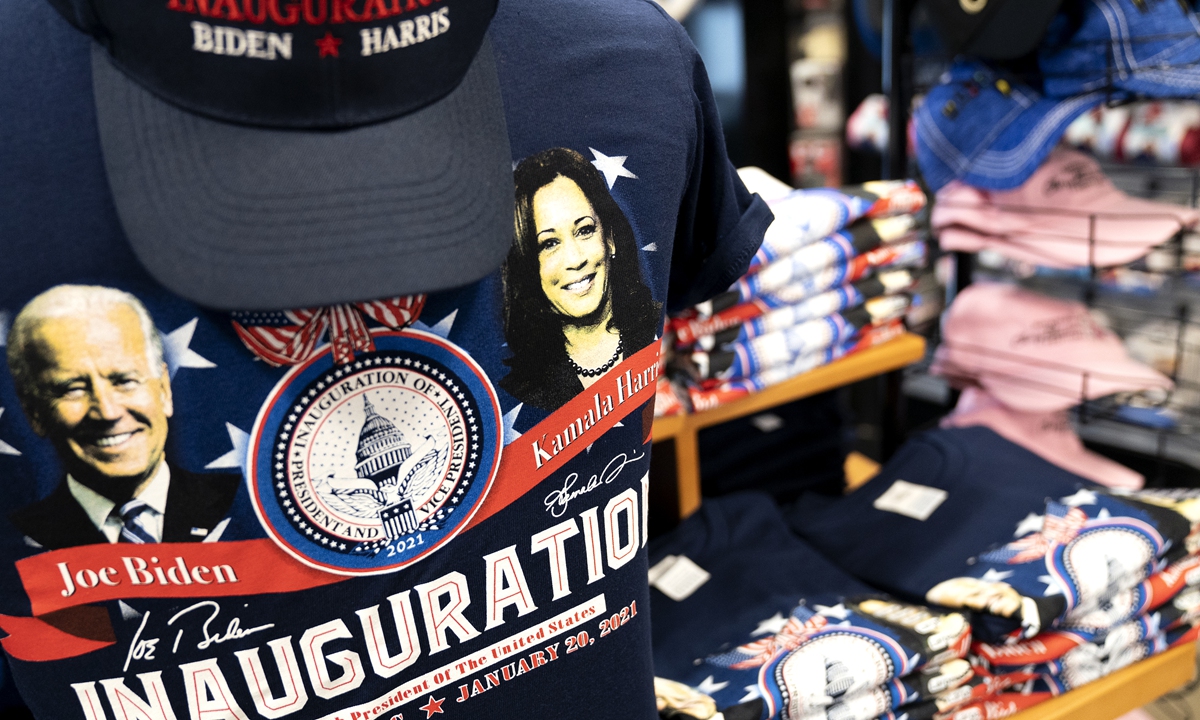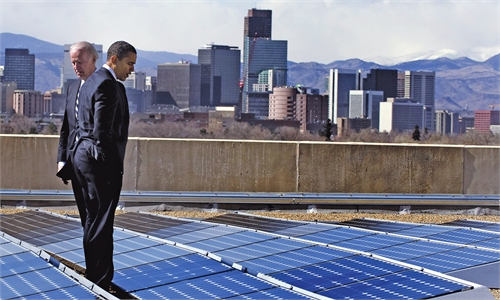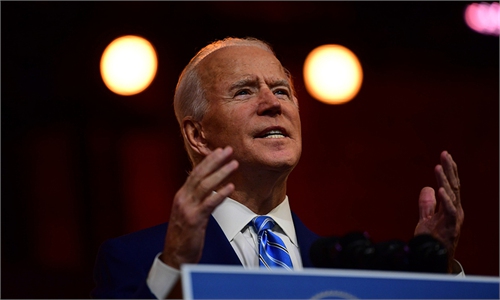China cautious over Biden nominees' ‘tough’ rhetoric
Words, detailed actions from US will be combed

Biden-Harris Inauguration merchandise is displayed at a store in Union Station on Thursday in Washington, DC. Due to security concerns, the National Mall will be closed on Inauguration Day on January 20, as people are encouraged to view the inaugural events from their home. Photo: VCG
Chinese experts remain cautious over the relatively tough policy stances toward China aired by several of incoming US President Joe Biden's cabinet minister nominees, saying that the harsh rhetoric on trade and other issues will persist under the new US administration, but specific trade measures against China will likely return to a certain degree of normalcy before Donald Trump's presidency.
In confirmation hearings at the US Senate on Tuesday, the nominees for top national security, foreign relations and economic positions struck a tough note on the new US administration's policy toward China, with Treasury Secretary nominee Janet Yellen vowing to use the "full array of tools" against what she described as "abusive" trade policies of China.
"We need to take on China's abusive, unfair and illegal practices," Yellen told US Senators, calling China the "most important strategic competitor" for the US, echoing other nominees, including Biden's pick for the Defense Secretary and director of the National Intelligence Office.
"Such harsh rhetoric is following the old playbook. [US politicians] have been saying the same things since [Bill Clinton]'s time that they want to change China's system," He Weiwen, a former economic and commercial counselor at the Chinese Consulate General in San Francisco and New York, told the Global Times on Wednesday. "These politicians used to play the same game."
However, following a multi-year bruising trade and technology war by the Trump administration, in which the US Treasury Department played a major role, Yellen's remarks were closely watched and even interpreted by some as a continuation of Trump's tough confrontational policies.
Though Yellen did not specify what "tools" her department will deploy against China, experts said that the US Treasury Department, which ranks very high within the US government on economic issues, has several options, including imposing sanctions on foreign entities and individuals and restricting foreign investment.
The department is also responsible for determining whether other countries manipulate the exchange rates of their currencies to gain trade advantages and overseeing the opaque but powerful Committee on Foreign Investment.
Many of the tools have already been used quite extensively by the Trump administration in its trade and technology war against China. Chinese experts said that while the Biden administration is unlikely to roll back those actions, it is also unlikely to take more such actions.
"[The Biden administration] does not approve of Trump's actions, because they lack legal basis in the US. But it will also not proactively cancel the tariffs already in place," Huo Jianguo, vice chairman of the China Society for World Trade Organization Studies, told the Global Times on Wednesday, adding that the US administration could use those as bargaining chips in future trade talks with China.
Huo added that it has become a common practice for US government ministerial nominees to talk "tough" on China during such hearings at the Capitol, where anti-China views are somehow prevalent.
But once confirmed and installed in their positions, "they have to make balanced options to ensure that their actions would not end up hurting US interests," he said, adding that this would be the fundamental difference between Biden's administration and the Trump administration, which did not appear to care about the cost of its ugly trade wars with China.
Trump's tariffs could cost tens of billions of dollars in extra taxes for US companies, over 3,000 of which have sued the administration over the tariffs, and as many as 245,000 US jobs. They are estimated to have cost US consumers $57 billion annually, according to US news reports.
"We can believe that any further escalation would only hurt both sides… and that [the Biden administration] would not take the same simple and rogue tactics used by the Trump administration," He Weiwen said.
The most likely approach the Biden administration would take, as Biden himself has indicated, would be trying to unite US allies to exert pressure on China, including forming new trade and economic partnerships in an attempt to isolate China, analysts said, noting that would be more of the same approach taken during the Barack Obama presidency.
But that would be a difficult task, as the dynamics have changed during Trump's presidency. After Trump abandoned the Trans-Pacific Partnership, which was hailed as a move to contain China, China has since signed the biggest trade pact with 14 Asia-Pacific economies and wrapped up talks for an investment deal with the EU.
As for China's response, "for now, we have to listen to what they say, but more importantly, we will have to watch what they will do," Huo said. "If the US takes unreasonable actions, we should respond. But we should also proactively pursue dialogue."
Commenting on the remarks by Biden nominees about China-US relations, Hua Chunying, a spokesperson for the Chinese Foreign Ministry, said that China is committed to avoiding conflict and confrontation, and will try to pursue mutual respect and win-win cooperation.
"At the same time, [China] will resolutely safeguard its sovereignty, security and development interests," Hua told a press briefing on Wednesday, urging the US to meet China halfway to engage in dialogue to manage their differences.




